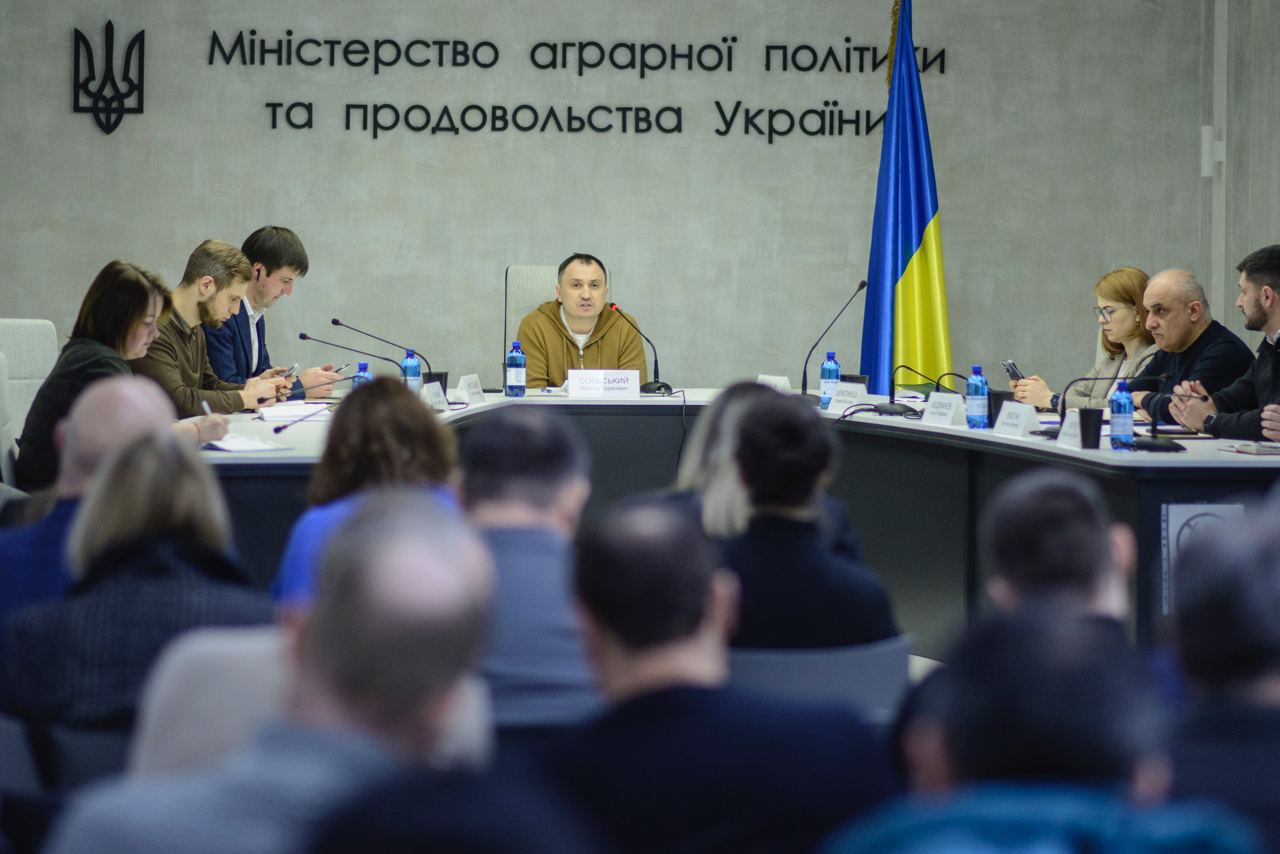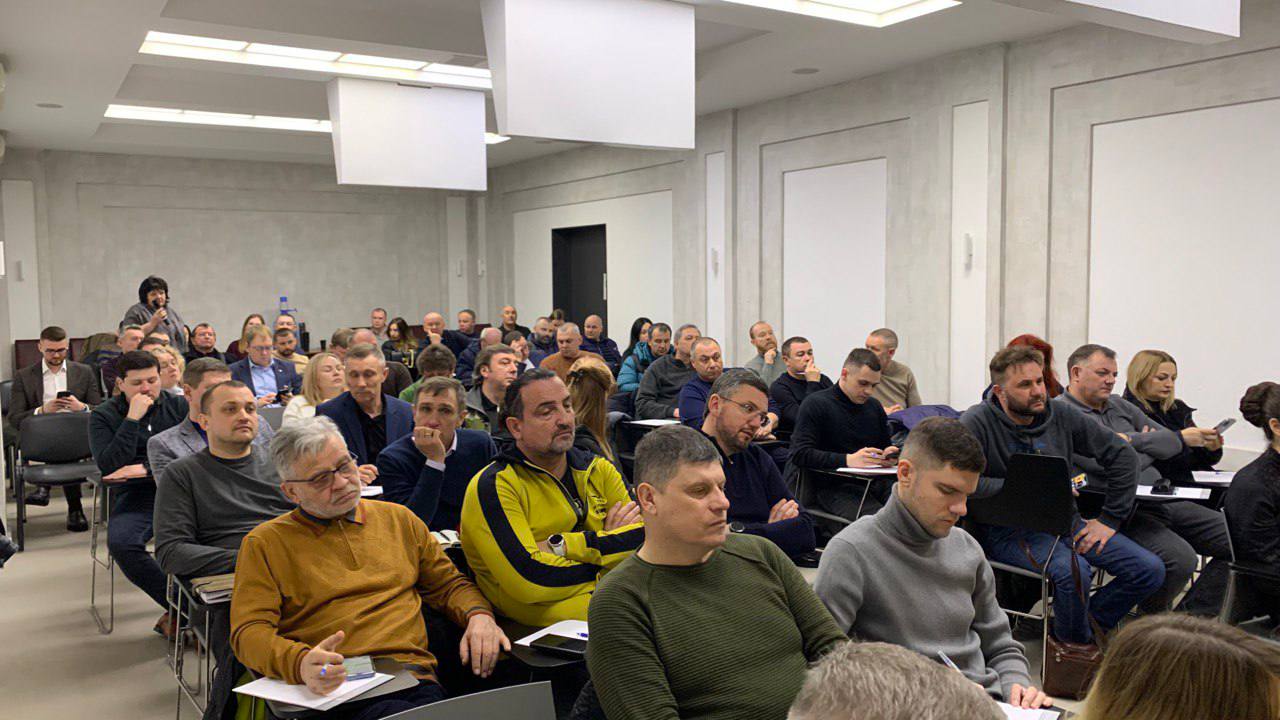
On March 8th, a meeting was held between agrarians participated in the Ukrainian Agri Council from the occupied and de-occupied territories of Ukraine, as well as territories affected by the hostilities with representatives of the Ministry of Agrarian Policy and Food of Ukraine.
Agricultural producers from Zaporizhzhia, Kharkiv, Kherson, Donetsk, Luhansk and Mykolaiv regions arrived in Kyiv for the conference.

The participants of the UAC have raised the most problematic issues that hinder their further business activities to the Minister of Agrarian Policy and Food of Ukraine Mykola Solskyi including:
- Unregulated legal framework in terms of collaborative activities,
- lack of tax benefits,
- lawsuits regarding the payment of utilities for de-occupied enterprises during the occupation period,
- not state support, including the extension of the "5-7-9" credit program,
- mined agricultural areas, etc.
According to the participants of the meeting, the Russian agressors in the temporarily occupied Ukrainian territories are forcing farmers to pay taxes to the Russian budget, to re-register their property according to Russian legislation. In case of refusal, they threaten with physical violence and complete destruction of farms.
"My enterprise is actually working, the staff of 40 people and 600 shareholders. I need to support them somehow. Running a business is a problem, as it needs to be clearly defined by law in which cases an entrepreneur is considered a collaborator, and in which cases it is not. People have stayed here to survive, they are waiting for liberation and clear decisions from the authorities," said a farmer from the city of Energodar in the Zaporizhzhia region.
The UAC has repeatedly emphasized that any activity in the occupied territories is considered collaboration according to the law and carries criminal liability. That is, all farmers who remain in the occupied territories and work are considered collaborators. Therefore, it is important to establish by law who is a traitor and who works for the sake of survival, and to adopt two draft laws, No. 7646: "On Amendments to the Law of Ukraine "On Ensuring the Rights and Freedoms of Citizens and the Legal Regime in the Temporarily Occupied Territory of Ukraine" regarding the peculiarities of activity in the temporarily occupied territory of Ukraine and draft law No. 7647 "On Amendments to the Criminal Code of Ukraine on Improving Liability for Collaborative Activities."
Also, a common problem among farmers is mass lawsuits regarding the charging of communal services to deoccupied enterprises.
A farmer from the Kherson region says: "It is necessary to specify the position of the commercial courts, which are currently considering lawsuits regarding the supply of gas and electricity to the occupied territories - territories where everything has been destroyed, including the infrastructure. My farm is in a similar situation - it is destroyed, and I have been presented with a huge bill, property is being seized on unoccupied territory. There are thousands of such courts and they consider cases in favor of energy companies, while agricultural producers are defenseless."
One of the most problematic issues is mining of territories. The sowing campaign cannot begin under life-threatening conditions. According to agrarians, mining of agricultiral lands threatens Ukraine with a decrease in cultivated areas.
"My farm, where I work, is almost 100% mined, I am on the front line. I believe that a separate working group should be created for such entrepreneurs to know what the first steps should be, because when the territory is liberated, the question how to continue farming will arise," said a farmer from the occupied territory, Donetsk region.
According to Deputy Minister Denys Bashlyk, demining of agricultural lands should be carried out region by region. The Mykolaiv region is a priority for demining, where 305,000 hectares need it. The first task is the demining of 3,000 hectares for planting vegetable crops, according to the local Agricultural Department.
"The Emergency Service Department can demine a certain area in a day. If we demine lands in several regions at the same time, it will be twice slower, so it was suggested to determine the order of demining. The Mykolaiv region provided the most arguments, and the military supported it. The process of demining Mykolaiv Oblast has started" added Minister Mykola Solskyi.
Among the priority issues raised by agrarians is the non-prolongation of the government program of affordable loan 5-7-9, as they lack financial resources for the purchase of seeds, fertilizers, and plant protection products.
A farmer from the Kharkiv region said: "I have a loan under the 5-7-9 program, for which guarantees were not extended and interest is charged. And when the company receives financial income, the funds are blocked and directed to repay the loans."
According to the Minister, the issue is under consideration and the extension of the Affordable loans program can be expected in the near future. He noted that current loans will be automatically extended, the program 5-7-9 will be resumed, but with a 50% state guarantee. In terms of taxes, there will be a privilege for the 4th group of entrepreneurs, and as for tax liability, it applies to all occupied and liberated regions, except for Chernihiv, Sumy regions and several districts of Kyiv region.
Based on the results of the meeting and in the context of the problems raised by the agrarians, the Ministry of Agrarian Policy and Food will hold a series of meetings and negotiations with representatives of other departments and deputies of the Verkhovna Rada.
Mykola Solsky emphasized the need for statements by farmers from occupied and liberated territories about the real situation of their farms and problematic issues that arise on the ground in the regions, as this will help specialized bodies to solve the situation faster and more effectively.
The UAC express gratitude to the Ministry of Agrarian Policy and Food of Ukraine for supporting agricultural producers, constructive dialogue and active participation in solving urgent issues of the agricultural sector.
Wednesday, 8 March 2023